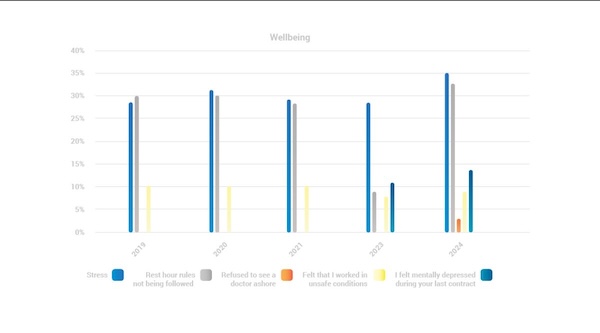
 Seafarer salaries are continuing to rise across the globe as the shortage of competent seafarers impacts the shipping industry across all sectors, says Danica Crewing Specialists. And, with a surplus of job offers available, seafarers can afford to be more picky – choosing positions not only on salary but also on issues such a more convenient joining date or a fleet with younger vessels.
Seafarer salaries are continuing to rise across the globe as the shortage of competent seafarers impacts the shipping industry across all sectors, says Danica Crewing Specialists. And, with a surplus of job offers available, seafarers can afford to be more picky – choosing positions not only on salary but also on issues such a more convenient joining date or a fleet with younger vessels.
The findings are revealed in the 2024 Seafarers’ Survey from Danica Crewing Specialists which asked more than 50 questions in it’s annual crew questionnaire. This is the fifth year Danica has undertaken it’s industry-wide survey, enabling the crew specialist to compare results back to 2019 and identify trends.

Seafarer salaries are continuing to rise across the globe as the shortage of competent seafarers impacts the shipping industry across all sectors, says Danica Crewing Specialists.
Wage increases occurred on all vessel types. The survey observes that Indian senior officers on dry cargo vessels continue to receive the highest wages – some 10% higher than their Eastern European and Filipino peers, who are remunerated at approximately equal levels at senior ranks. However, Filipino junior officers are paid less then their Eastern European and Indian peers. Senior ratings (Bosun, Fitter, Pumpmen and cooks) remain in demand and also saw increasing wages.
Announcing the results of the 2024 Seafarers’ Survey in Manila, Philippines, this week, Henrik Jensen, Danica Crewing Specialists CEO, commented: “The combination of a general shortage of, and a hunt for, well-competent seafarers, along with a better financial situation for most vessel owners at present, is making employers more generous with their remuneration and causing wages to continue to increase.”
Noting emerging trends within rank levels and years’ service at that rank, he warned: “We see the shortage of senior officers encouraging some owners to accept new hands directly employed in a rank higher than their last rank with their previous employer. And we are seeing a steep increase in CVs with fake experience. Seafarers are using certain ‘consultants’ to help with crafting these fake CVs and the level of falsification is rather advanced.”

The Danica 2024 Seafarers’ Survey records rises in crew welfare concerns.
In the 2024 results 58% of seafarers said they had changed employer at least once over the previous three years. Analysing the five years’ worth of Danica’s Seafarers’ Surveys shows that in 2019 25% of crew said they changed employer for a higher salary whereas today that figure has risen to 37%. Free access to the internet, newer vessels, better promotion opportunities, and pension plans/medical insurance are also key drivers to switching jobs.
Danica surveyed its database of almost 70k seafarers worldwide, as well as reaching out to other crew via social media. Some 4,868 seafarers from a range of vessel types completed the survey, a drop on previous years which the company attributes to the survey no longer being accessible to Russian crews. Data was collected between May and September 2024.The largest number of respondents were from senior ranks.
Mr Jensen said: “We are pleased for the fifth year to share the results and analyses of our 2024 Seafarers’ Survey with our maritime colleagues and we hope it will again provide a useful tool to enhance HR-marine strategies and to shed light on the current status of the crew employment markets.”
At a time when there is fierce competition of competent crew, it might be expected that seafarer wellbeing would be a priority for employers. Yet the Danica 2024 Seafarers’ Survey records rises in crew welfare concerns. In particular, the number of seafarers reporting shortage of food and drinking water continues to be alarmingly high at 25% and increased from 20% back in 2019. Seafarers reporting they have not been paid on time remains high at 35% – only 1% less than in 2023, while 7% said they did not receive their salary in full. Although the number of seafarers not being relieved on time has fallen significantly since the pandemic, there are still one in five seafarers who do not get home on time.

Henrik Jensen, CEO, Danica Crewing Specialists.
One in eight of respondents reported experiencing bullying and harassment at sea, while 35% reported non-compliance with statutory rest hours rules. The number of seafarers who felt mentally depressed during their last contract increased from 11% in 2023 to 14% in 2024. This year Danica also questioned how many seafarers had been prevented from seeing a doctor ashore and 3% answered this was the case.
A little over half of respondents said they have access to support if they do not feel mentally well and, of those, more made use of this facility in 2024 (30%) compared to 2023 (23%). However, the percentage of seafarers who found the offered service useful dropped from 75% to 65%.
With a strong Eastern European crew network, Danica also asked questions specific to Ukrainian seafarers. As a result, it identified that some 70% say they will return to Ukraine when the war ends, although the number saying they never plan to return has increased to 20% from 12% in 2023.
Source: Danica